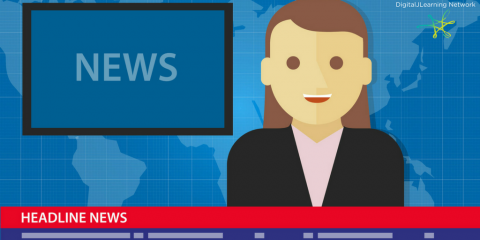Legitimacy vs. Lies: News Literacy in Schools

It is an awesome power to be able to learn anything, anytime.
Today, more than ever, each of us can access practically infinite amounts of information at the touch of a button. News articles, political rhetoric, historical texts, video footage of remote places, opinion editorials, documentary films, Twitter feeds, and so much more - all at our fingertips. How we find, analyze, interpret, and evaluate this influx of information is of paramount importance to how each of our worldviews is shaped and our personal opinions defined.
The expansion of digital media options and the revolution in social media have made it possible for us to be in constant communication with everyone else. Anyone can now publish their knowledge and opinions online with relative ease. While the Internet has served as a great tool for democratizing information access, it has also become consistently more difficult to tell apart the real, the fake, and the satirical. The responsibility to sift through everything available to us to get to the truth falls on us as individuals. If even as adults we are often overwhelmed by the sheer volume and variety of available information and its substance, what does that mean for today’s young people? How do we ensure that, when they are online, our students know how to tell facts from fiction and truth from lies? How do we arm them with the tools they need to be critical thinkers and active, questioning, digital citizens?
As a leader of professional development sessions for teachers on the use of technology, I am often asked how we can protect our students from things available online that are not appropriate for them or not accurate. And every time I have to disappoint people as I let them know that the simple truth is - we cannot. More importantly, I believe that we should not. No matter how hard some schools work to limit Internet access or personal device use--and no matter how carefully parents are watching at home--it’s virtually impossible today to legitimately limit young people’s access to information and the Internet. But rather than making this our greatest fear we can make it our great opportunity.
We can use this moment as educators, and especially as Jewish educators, to be proactive, not reactive, in teaching students about appropriate and responsible use and analysis of online resources. We should teach them to ask questions and think critically about what they read. We must equip them, starting from an early age, with the tools and skills to be able to navigate online environments safely and responsibly as ultimately this will be empowering for both us and them. With some research, time, and effort, we can raise a generation of students for whom good digital citizenship will be second nature.
I work with schools that run the gamut from very open to very closed about their Internet and personal device policies. Those schools that give students the most access while also thoughtfully implementing digital citizenship curriculum report more confidence in their programs from students and parents. Their students engage with the curriculum, feel empowered, and generally use the choice and agency they are given to become better learners. Parents feel more comfortable knowing that their students are being taught not only core subjects and Judaic studies, but also how to exist and communicate successfully in the increasingly connected world in which we live.
Of course, I don’t look at these issues through rose-colored glasses. Children (and adults) will occasionally be confused or misinformed, make mistakes, and fail to live up to the hopes we have for them. But with the amount of technology our students are using every day, we cannot afford to ignore issues of digital citizenship and digital literacy and simply hope that setting limits will work. We must not be afraid to allow them to explore and learn while we set an example, speak up, and ensure that they know how to properly interpret what they find. I call on us to implement in all grades and across all subjects, comprehensive and age-appropriate digital citizenship and news literacy programs. It is our duty to teach our students how to be good citizens and critical thinkers in both their real lives and their virtual ones.
Tatyana Dvorkin is Director, DigitalJLearning at The Jewish Education Project. Learn more about EdTech and other topics at the 2018 Annual Yeshiva Day School Day of Learning.

